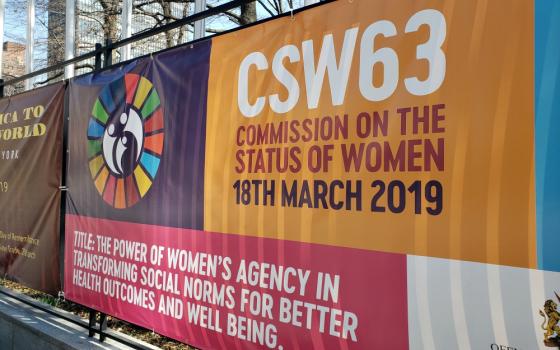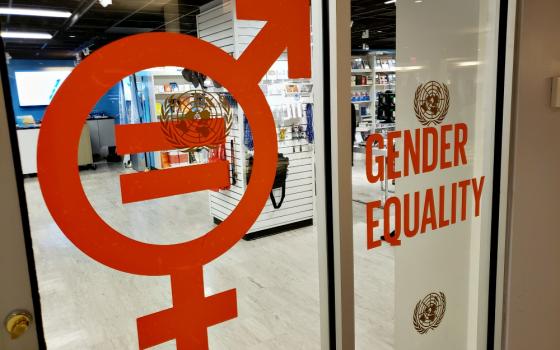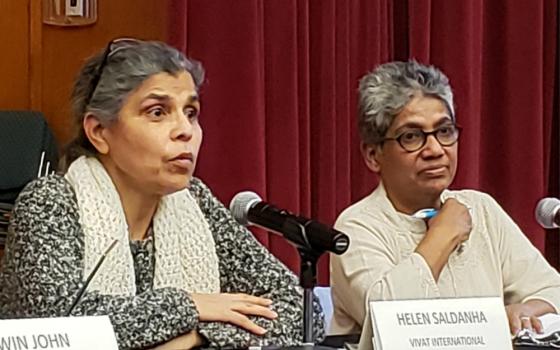The 63rd session of the United Nations' Commission on the Status of Women concluded its work late March 22 and affirmed U.N. support for social protections that help in global efforts to end gender discrimination.
Among the recommendations adopted are investing in protections, such as education, that are not as robust for women and girls as they are for men and boys.
The U.N.'s principal commission "dedicated to the promotion of gender equality and the empowerment of women" also adopted a recommendation that progress already made in "women's access to social protection, public services and sustainable infrastructure" not be reversed by austerity measures or budget cuts from national or regional governments.
The commission recommendations are not binding on U.N. member states but rather are seen as a road map or blueprint for them to follow.
Phumzile Mlambo-Ngcuka, executive director of UN Women, the U.N. organization that organizes the two-week annual meeting, said the March 11-22 event has never been "more significant for the women and girls of the world."
"The commission's recommendations pave the way for governments to engage and invest differently; involving women in policy dialogue, and targeting initiatives that go to the heart of the largest barriers to the empowerment and voice of women and girls," she said, according to UN Women.
The 2019 event drew a record number of participants, UN Women said, with nearly 2,000 delegates and 86 ministers from U.N. member states and more than 5,000 representatives from "civil society": nongovernmental groups advocating for specific agenda items.
Catholic sisters are among those in that category, and one of them, Sr. Winifred Doherty, U.N. representative of the Congregation of Our Lady of Charity of the Good Shepherd, characterized the overall final document as "good," though not as strong in some areas as she would have liked.
The document contains language about "national safety nets," which Doherty told Global Sisters Report does not adequately approach what she and other advocates believe is necessary — that social protections be based on a commitment to universal human rights.
She also said a section in the document on domestic violence against women contained general language that did not explicitly address the role of "intimate partners" in such violence.
Disagreements and even controversies are no strangers to the commission. One that emerged this year was the Holy See's presence at the United Nations. The advocacy group Catholics for Human Rights announced a public campaign asking the United Nations to revoke the Holy See's status as a U.N. non-member permanent observer.
In a March 14 letter to U.N. Secretary-General António Guterres released during a public event the same day at the Church Center for the United Nations, the advocacy group said the Holy See's status gives it "access and power that disadvantage and discriminate against billions of people around the world, shielding itself against accountability for what amount to crimes against humanity," citing sexual violence against children and vulnerable adults.
The Holy See's status at the U.N., the group said, amounts to a "harmful charade" and "must end now."
Speaking a day later at an official commission event, Archbishop Bernardito Auza, the Holy See's apostolic nuncio at the U.N., did not address those claims but spoke broadly of the themes of the two-week gathering. "The wider society and the economy all benefit from women's dedication, hard work and fundamental contribution, but social welfare programs must offer to them the recognition and social protection that they deserve," he said. "Without this, many women will continue to suffer discrimination and social injustice."
Auza added: "The Holy See frequently underlines the special gifts and contribution of women within the family and society, especially with regard to integral human development. Their unique presence, as physical and spiritual mothers, in the creation and raising of children, their vision and capacity that include defending, nurturing and caring for life, from conception until natural death, require them to be given all the means to fully realize their inherent dignity."
The issue of dignity underlined events sponsored by sister congregations. A March 18 event co-sponsored by the Sisters of Mercy of the Americas and the Congregation of Our Lady of Charity of the Good Shepherd focused on collaborative approaches toward tackling the problem of human trafficking.
Sr. Jean Quinn, who heads the U.N.-based advocacy group UNANIMA International and who served as moderator of the event, noted that the "lack of access to social protection leaves women and girls vulnerable to trafficking" and that "human rights form a central plank of our new understanding in relation to trafficking. There is now a widespread acceptance of the need for a human rights-based approach to trafficking."
Quinn said human rights violations against women and girls "are both a cause and a consequence of trafficking in persons. It is essential to place the protection of all human rights at the center of any measures taken to prevent and end trafficking."
The human rights of women and girls need to be ensured "throughout their lifetime," Quinn said.
Mely Lenario, a trafficking survivor from the Philippines who is now an anti-trafficking advocate with the Good Shepherd Sisters in the Philippines, agreed, saying social protections like good education need to be more robust, a responsibility that falls onto local, regional and national governments.
"[Trafficking] survivors and their children need to be provided government services so that they are not further exploited," said Lenario, who also spoke at the 2018 commission. This year, she urged that voices of survivors be heard in developing social protection policies.
The need for social protection policies to be based on the experiences on those at the grassroots was also a theme at a March 14 event that examined neighborhood grassroots organizing with involvement by faith-based nongovernmental groups.
In the southwest Indian state of Kerala, such organizing has empowered women, in part because women tend to be more prominent in the day-to-day life of neighborhoods, participants said. One result: In recent local elections in Kerala, more women than men were elected to local government bodies, participants noted.
"It's important to have a 'bottom-up approach,' " said Sr. Helen Saldanha, a member of the Missionary Sisters Servants of the Holy Spirit and an executive co-director of VIVAT International, a global human rights advocacy organization that works at the United Nations. She added that any recent progress in improving social protections in India was due to pressure from grassroots organizing.
"As a strategy: Begin small," she said.
Her colleague, Sr. Elsa Muttathu, who represents the International Presentation Association at the United Nations and was another participant at the March 14 event, said that change "has to work from where people are." Greater participation in local efforts to improve social services, for example, means there is more incentive for local authorities to do something that helps people improve day-to-day life.
"The more we participate, the more we can achieve reality," she said.
In an interview prior to the end of the two-week commission, Saldanha, whose previous ministries including working with domestic workers in the western Indian state of Maharashtra, said she understands why events like this may seem abstract and not connected to political or social realities in places like India.
But she said U.N. resolutions and conferences do have "an impact in some way" on national and local policies. She cited the example of the Convention on the Elimination of All Forms of Discrimination against Women, adopted by the U.N. General Assembly in 1979.
That convention helped lay the groundwork for later legislation against domestic violence in India, passed in 2005, Saldanha said.
"There are connections; there are links," she said. "International policies do have an impact."
Even so, Doherty, an Irish sister, said she hopes the current commission document will be read by all departments of a national government, not merely the section focused on women's rights.
"How will it be read at the national level?" Doherty said. "If it remains only a 'U.N. document,' it doesn't change anything."
Doherty noted that the struggle for women's equality is never easy. At the final Friday night meeting, which Doherty attended, vice chair Koki Muli Grignon of Kenya said she received hundreds of "bullying" emails and phone calls questioning her role in the commission.
That promoted a response from Cynthia Chidiac, a member of the Lebanon delegation, who quoted French feminist author Simone de Beauvoir: "Never forget that it will be enough for one political, economic or religious crisis for women's rights to be questioned. These rights can never be taken for granted. You must remain vigilant your whole life."
Reflecting on that, Doherty said, "We have to continue the struggle. It will continue to be a fight all of the way."
[Chris Herlinger is GSR international correspondent. His email address is cherlinger@ncronline.org.]




